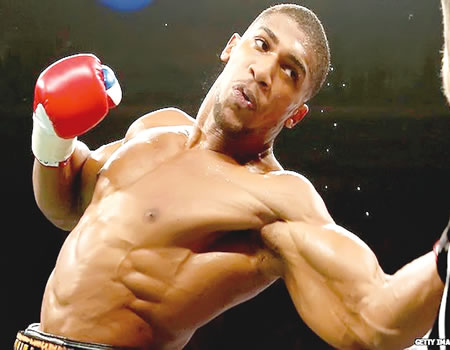Tweeting to his 1.1 million followers after retaining his IBF world heavyweight title and winning the vacant WBA ‘Super’ and IBO belts two Saturdays ago, Anthony Oluwafemi Olaseni Joshua declared, “It was all a dream!”
A dream: he couldn’t have chosen a better word. The 27-year-old’s rise to fame wasn’t exactly a smooth one. Before he became a fulltime boxer, he worked as a bricklayer. In 2009, he was remanded in Reading Prison in UK, for what he would later describe as “fighting and other crazy stuff”, and would wear an electronic tag around his ankle, upon release. In March 2011, he was sentenced to a 12-month community order and 100 hours’ of community service, after pleading guilty for possessing 8ozs of herbal cannabis which was found in a bag in his car. He was afterwards suspended from the English national boxing team, until 2011 when he returned to participate in the World Championships.
Today, Joshua has become a global icon; he took his latest crown in front of 90, 000 fans who were present at Wembley Stadium, and millions of viewers from around the world, all of whom watched him defeat the 41-year-old Ukranian boxer, Wladimir Klitschko, who has been described by IBTimes UK as “the most dominant heavyweight of the 21st century.”
“Those fans at Wembley got to see a rare moment; the fall of a great champion and the emergence of a new great, a British-Nigerian Londoner, once a bricklayer, who is now laying the foundations to become the sport’s first billionaire,” the IBTimes report said.
Charming
But there are other senses in which this fighter with Nigerian blood personifies the depth and complexity that make dreams such remarkable things. For example, he is a complex thinker. Since his Saturday win, he has posted several inspiring messages and recordings on social media, speaking about his motivations and the principles he holds dear.
“There has to be a time, and timing is everything… I do not live in the past; I live in the present, and I am prepared for the future. In (the word) “unity”, there is “I” which is individualism, and there is “U”; but together, the unit is better than one… and I want to say that without “U” (you), there is no “I”, because the “U” is what starts the unit,” he told a small gathering of friends, in a short video he posted on Twitter on Wednesday. It was from a night out at the Smith and Wollensky restaurant in London. Also present was his cousin, Ben Ileyemi, who is also a professional boxer.
It was a celebration, and the speech which he made with a raised glass of wine was in fact the toast – words of wisdom, spiced with charming playfulness. “There is no ‘I’ in ‘team,’” he added.
Relentless
To think of Joshua’s life merely as that of a young man who rose from the level of a bricklayer to that of a world champion downplays the many processes that went into it.
He began boxing in 2007; and in 2010 he won the ABA Championships. He was offered 50, 000 pounds to turn professional that year, but he gracefully turned it down, because he was not ready. He joined the Great Britain Boxing Team that year, defeating Amin Isa at GB Amateur Boxing Championships. In 2011, he won a silver medal at the World Amateur Boxing Championships.
He became even more prominent on the global stage in 2012 after defeating 32-year-old reigning gold medallist, Roberto Cammarelle, to become the new Olympic Champion. In the following year, he was awarded a national honour of the Member of the British Empire (MBE) in recognition of his achievements in sports.
Joshua has just been ranked world’s best heavyweight by Transnational Boxing Rankings Board and BoxRec.
First billionaire
If Joshua’s current status is all glimmering and glorious, his future appears even more so. For example, it is believed the superstar raked in a whopping 15 million pounds after his last fight. IBTimes UK has reported that it has always in fact been the boxer’s dream to become the first boxing billionaire in the world.
Speaking with GQ magazine sometime ago, Joshua said, “When I first started, the aim was to become a multimillionaire. But now, there are ordinary people, grandmas and granddads, who are worth millions just because of property prices.
“So the new school of thought is that I need to be a billionaire. Being a millionaire is good, but you have to set your sights higher.
“If I’m making 10 million pounds from my next fight, my next target should be 10 times that. And if I get to 100 – 150 million dollars, why not go for the billion?”
Nigerian roots
Anthony Oluwafemi Olaseni Joshua is decidedly Nigerian – born to a Nigerian mother and a British father with roots in Nigeria and Ireland.
An earlier video which was re-circulated moments after his last victory showed him say a few words in his native Yoruba. “Die die (a little),” he answered, when asked if he could speak the language. He did not stop there: he attributed a huge part of his success story to the goodness of Nigerian delicacies like “eba” and “fufu”.
Even though there are questions as to whether he is more loyal to Britain or Nigeria – questions that have formed part of many social media jokes in Nigeria – Joshua’s ancestry is not really the point of contention. It is more accurately a criticism of the country’s inability to nurture and preserve its own, to provide an environment that makes it possible for great talents to thrive.
There may yet be hope: one of Nigeria’s most vocal senators, Mr Ben Bruce, has urged the Federal Government to invite the boxer over to Nigeria and make him the country’s cultural ambassador.
“The best thing we can do for our image is to invite Anthony Joshua to Aso Rock for a hero’s welcome and make him a brad ambassador for Nigeria!” the Senator tweeted.






